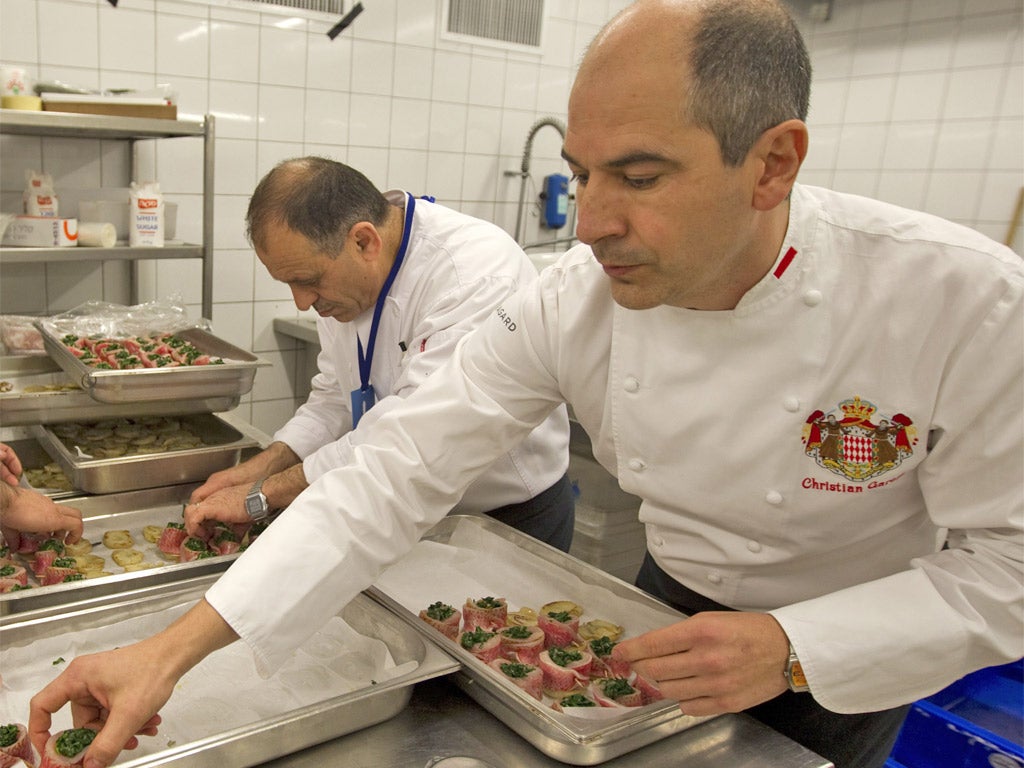John Walsh: Too many cooks can solve all the world's problems
Notebook


The most exclusive foodie club in the world meets this week in Berlin to celebrate its 35th anniversary, and reaffirm the importance of food in preserving global amity. The members of Le Club Des Chefs Des Chefs ("the Club of Leaders' Chefs") are the world's most powerful cooks, the people who feed heads of state every day in the kitchens of Buckingham Palace, the Elysée Palace, the Berlin Chancellery, the Kremlin…
They're meeting this week to construct seven dinners to celebrate 50 years of post-war France-German harmony; but who knows what behind-the-swing-door secrets will be exchanged about the shortcomings of Putin, Obama, Merkel, Monti, Cameron and others? What food will be mutually recommended by the chefs, to make sure the next G8 summit about Euro-fascism goes smoothly? Too long a wait for the hors d'oeuvres can bring on hypoglycaemia and put everyone in a filthy temper. Too fancy a truffle sauce and you're looking at hours of dyspepsia, ensuring a blazing row.
The CCC was founded in 1977 at the Paul Bocuse restaurant in France, the brainchild of Gilles Bragard, who made a fortune selling high-class chef uniforms. Gilles brought together eight chefs who cooked for heads of state, and they got on like a Reichstag on fire. So a club was formed. "Politics divides men, but a good meal unites them," became their motto. The number of members grew – and so did a sense of the club's power. Joel Normand, who has cooked for every French president since De Gaulle, said, "I've had aides of previous presidents tell me: thanks to you, chef, we managed to conclude the signing of a treaty."
They're sworn to secrecy about their masters' and mistresses' tastes, but word sometimes leaks out. We know from them that Prince Albert of Monaco is a keen cook and likes to help at royal banquets (so don't complain about the poussin, ok?). We know Angela Merkel's a fool for potato soup, that Barack Obama hates beetroot and that President Hollande can't abide artichokes. In previous years, foreign heads of state could exploit the knowledge that George W Bush was addicted to peanut butter and jam sandwiches, and Nicolas Sarkozy to chocolate.
That gastro-diplomacy plays an important part in international relations we know from Cita Stelzer's fascinating book, Dinner With Churchill: Policy-making at the Dinner Table, which showed that the course of war can be dictated by dinner. In 1942, when Churchill first met Stalin in Moscow, they failed to agree about launching a "second front" against Germany. Relations were fraught. The supposed allies were hardly even cordial. At 7pm, Churchill went to say goodbye – and was promptly asked to an impromptu dinner at Stalin's private apartment. They talked for six hours, interspersed with food hurriedly prepared by the Man of Steel's top chef. Stalin alarmed Churchill with his disgusting table manners – he offered him a pig's head, cut chunks off its cheeks with a knife and ate them with his fingers – but they finally parted the best of friends. So there we have it: the hand that stirs the bouillabaisse is the hand that rules the world.
Sip on? Chew on? Keep off!
Here's another attempt to send the nation's pedants into apoplexy. Collins dictionary has announced that, henceforth, any Sam Schmuck can coin new words and send them in for possible inclusion in its pages. "By allowing the public to truly participate," said Alex Brown, boss of Collins Digital, recklessly splitting infinitives, "we're ensuring that we stay on top of the evolving English language."
No, you won't, Alex – you'll disappear under a wobbling mountain of rubbishy portmanteau words ("trendfear," "mantyhose") that will never be used by anyone outside style magazines. Which are becoming unreadable lexicons of transatlantic balls.
Last Sunday, I read an article in which Kate Upton was described as "sipping on a Starbucks", "chewing on an ear of corn" and "sucking on an ice lolly". It's not made-up words that drive pedants wild. It's all the gratuitous "ons".
Join our commenting forum
Join thought-provoking conversations, follow other Independent readers and see their replies
Comments
Bookmark popover
Removed from bookmarks